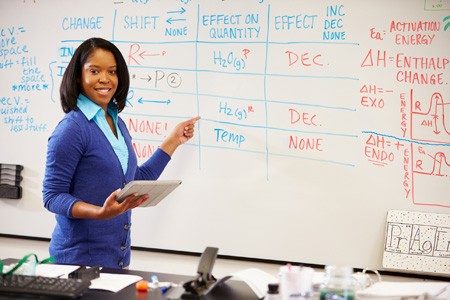Professional Responsibilities
Schools are charged with the responsibility of hiring professionals with values that align with the "Science for All" philosophy, who possess the pedagogical content knowledge required to enact a rigorous chemistry curriculum, and who view themselves as lifelong learners. Some of the research-based strategies that teachers should be aware of to achieve this vision of equity include the following:
- Be aware of research on best practices aimed at teaching and reaching all students;
- Transform and adapt instructional practices to promote student learning;
- Serve as equity role models in the classroom and to the community at large;
- Recognize and teach to students’ strengths;
- Provide a learning environment focused on trust and fairness; and
- Connect with the culture of students, students’ families, and the community.
Support to teachers from the school and/or district to meet these requirements should be provided.
Equity
ACS has produced many publications that explain the organization’s beliefs and values with respect to equity. All chemists rely on ACS to promote inclusion and diversity within the discipline and teachers of chemistry to apply equity within the classroom setting. “Science for All,” a phrase used by many—most notably the American Association for the Advancement of Science—is the cornerstone of the vision for high school chemistry.
ACS fully supports the goal of a scientifically literate society and maintains that one way to achieve this goal is by providing equal opportunities for all students to learn chemistry. The implications of this position extend beyond the needs of a single classroom. Schools and the states that support them are responsible for supplying the resources needed for the development and enactment of a chemistry program that is inquiry-based, student-centered, and accessible to all learners so they may succeed. Learn more on the All Students Can Learn Chemistry page.
Ethics
Chemistry teachers work as both professional educators and as science professionals. In addition to adopting an ethical practice as science professionals, chemistry teachers are responsible for adhering to ethical conduct within the scope of their practice in the classroom.
Ethical teachers present course content without distortion, bias, or personal prejudice. They model and promote ethical experimental design, honestly report and interpret data, reference sources of information, and credit the work of others. They refrain from misrepresentation of self and others and not engage in fabrication, falsification, or plagiarism of ideas, images, or information.
Teachers must maintain confidentiality when evaluating student performance and exhibit ethical, professional, and respectful interactions within the education and scientific communities.
They must make conscious decisions to promote safety and limit negative environmental impact by the design and enactment of the curriculum; they should model environmentally responsible actions for students.
Teachers should consider how they and their students consume energy and other natural resources. Similarly, in the laboratory, an environmentally responsible curriculum includes, but is not limited to, the appropriate selection, storage, use, and disposal of chemical reagents, as well as the use of micro procedures, when suitable.
Learn more about laboratory safety.


